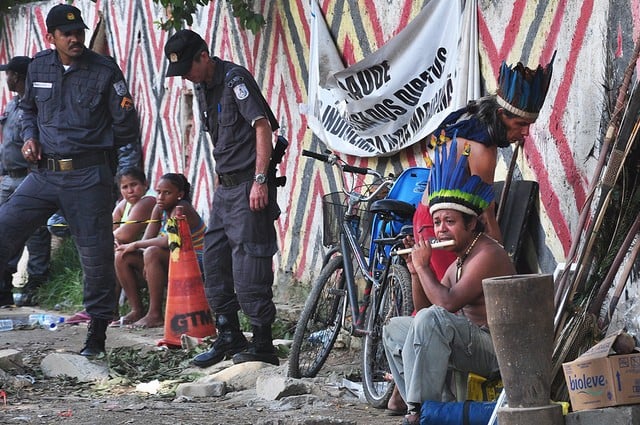
MRG ’broadly welcomes’ American Declaration on Rights of Indigenous Peoples, but expresses concern on lack of need for free, prior and informed consent on land issues
Minority Rights Group International (MRG) commends the long-awaited adoption on 15 June 2016 by the Organisation of the American States (OAS) of the American Declaration on the Rights of Indigenous Peoples, but is concerned that meaningful consultation with indigenous peoples around land rights issues falls short of international norms.
‘We broadly welcome the Declaration, but are also deeply concerned about the lack of need for free, prior and informed consent from indigenous peoples on crucial issues regarding land and territories,’ says Lucy Claridge, MRG’s Legal Director.
The Declaration, which has been in the pipeline since 1989 and is the first instrument in the history of the OAS to promote and protect the rights of the indigenous peoples of the Americas, addresses key issues, such as recognition of the rights of indigenous peoples in voluntary isolation, and the protection of sacred sites. It also reaffirms the reality that indigenous peoples form diverse societies integral to the Americas.
‘Despite the positive impact the OAS’ Declaration may prove to have on indigenous peoples, important rights and recognitions set forth in the UN Declaration on the Rights of Indigenous Peoples (UNDRIP), adopted by the UN General Assembly in 2007, are conspicuously weaker or not included at all,’ adds Claridge.
‘The lack of need to seek Free, Prior and Informed Consent before relocation of indigenous peoples from their lands is particularly worrying. In addition, the requirement for indigenous peoples’ land rights to comply with the national legal systems of each state has the potential to undermine the valuable protections afforded by international human rights law.’
In some cases the new Declaration does adhere to benchmarks set out in UNDRIP, such as the requirement of states to consult and cooperate in good faith with indigenous peoples regarding the adoption and implementation of any legislative or administrative measures which may affect them.
However, the drafting process’s inclusion of indigenous peoples has been ‘tepid’ according to MRG, and has remained considerably below the standard of meaningful and effective participation required for international processes.
Notes to Editors
- For a detailed analysis of the Declaration see this document from the International Work Group on Indigenous Affairs and the Observatorio Ciudadano Chile
- Minority Rights Group International is the leading international human rights organization working to secure the rights of ethnic, religious and linguistic minorities and indigenous peoples. We work with more than 150 partners in over 50 countries.
- Find out more about indigenous peoples’ land rights on MRG’s website
For more information or to arrange interviews contact:
Emma Eastwood – MRG Press Office (London, UK)
T: +44 (0)207 4224205
M: +44 (0)7989699984
Twitter: @MinorityRights